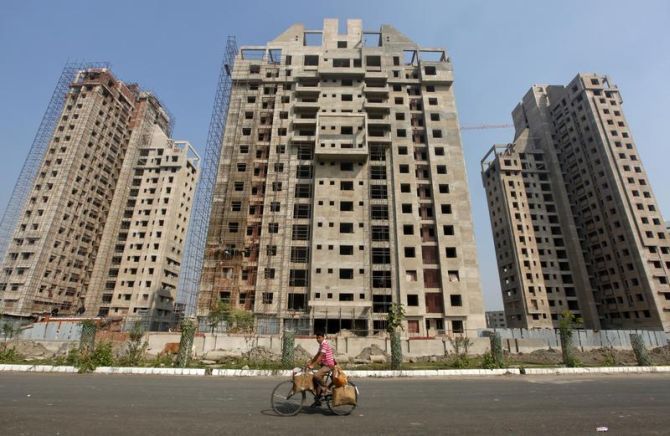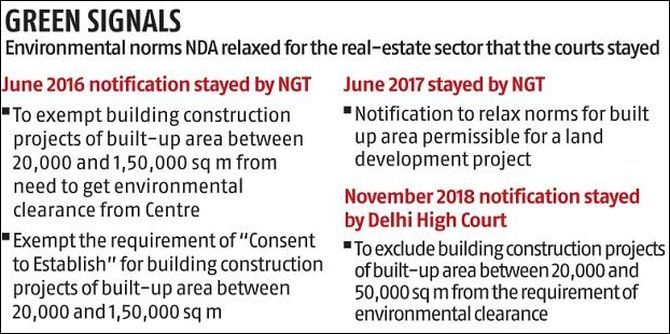 | « Back to article | Print this article |
The ease with which city-level master plans are altered and land-use patterns changed without considering carrying capacities or the overall environmental footprint of urbanisation in different states has already created water and air pollution crises in several emerging and existing cities.

One of the National Democratic Alliance government’s major achievements in the last year of its tenure has been to improve India’s rankings in the Ease of Doing Business index.
India moved 23 spots up the charts to reach 77 on the Ease of Doing Business ranking.
A key contribution to this improvement came for from simplifying the layers of permissions required for the real estate and construction industry.
The ranking system assessed how few and how fast construction permits are secured in Delhi and Mumbai.
The government secured a better ranking in 2018 through this narrow focus of bringing reforms in the two major cities but it also made a concerted effort to provide an overall regulatory relaxation for the real estate industry across the country, particularly tweaking norms for environmental clearances.
The problem is that these over-arching regulatory relaxations that influenced the Ease of Doing Business ranking for the real estate business are stuck in litigation (see table).

When challenged by environmentalists before the National Green Tribunal (NGT) and other courts, the alternative green clearance regime the NDA government tried to set in place has been repeatedly stayed.
The cases are still in court.
The central thrust of several changes the Union government introduced to help the real estate sector by tweaking the environment regulations was three-fold.
First, the tweaks sought to reduce the number of green permits required.
Second, they passed the onus of giving these clearances to municipal authorities.
Third, they laid down simple and preset conditions under which these clearances would be granted.
These relaxed norms were designed to help particularly large construction projects, such as malls and housing colonies.
The permits, the government decided, would be given by municipal authorities with barebone conditions that were preset.
These the builders could secure along with the building plan approvals that are given by district authorities.
The real estate projects were also exempted - through executive orders - to not require additional permits under the Acts that regulate air and water pollution.
But environmental groups petitioning against these changes raised both procedural concerns in how these eased norms had been established as well as the consequences they would have on the environment.
To be sure, centralised green clearances to real estate projects through a process that other industries also have to undergo have always been controversial.
Real estate groups have warned that centralising these clearances open avenues to rent-seeking.
Other critics have noted that the clearance process also did not aid in better planned urbanisation.
Centre for Science and Environment (CSE) is one of the prominent environmental think tanks that has argued for a decentralised regime for environmental approvals for the sector.
But it has argued for decentralisation and not deregulation - recommending that state - and district-level capacities to assess such projects should be augmented and that environmental management should be a strengthened but separate function at the local level.
Eventually, even CSE disagreed with the form and nature of "reforms" that the Union government brought about.
In trying to remove multiple green permits for the real estate sector, the government tried to short-circuit the legislative changes that were required.
The multiple permits are required under three different environmental laws - the Environment (Protection) Act, 1986, the Air (Prevention and Control of Pollution) Act, 1981, and Water (Prevention and Control of Pollution) Act, 1974.
Ideally, to do away with multiplicity of green permits the government needed to amend the latter two.
But these are implemented by the states, which would have entailed the painful if eventually more effective route of bringing states on board.
The Union government instead passed executive orders trying to overrule the laws.
Executive orders and notifications by governments cannot subvert the letter or spirit of principle laws that they are drawn under.
At a more fundamental level, while decentralisation was the right direction to take, the government did not propose a robust state and municipal level system to actually assess how each real-estate project would fit into the development plan of the cities.
The ease with which city-level master plans are altered and land-use patterns changed without considering carrying capacities or the overall environmental footprint of urbanisation in different states has already created water and air pollution crises in several emerging and existing cities.
Previous Union governments, too, have tried to ease the burden of clearances for the real estate sector through executive fiat rather than bringing the states on board to revise the entire regulatory and legal regime.
The burden now falls on the next government at the Centre to ensure an improved ease of business to the sector and ensure that planned and environmentally-sustainable urbanisation gets a firmer legal grounding.
Photograph: Reuters